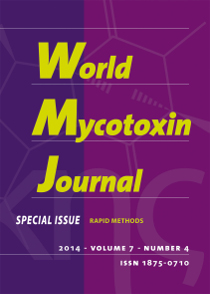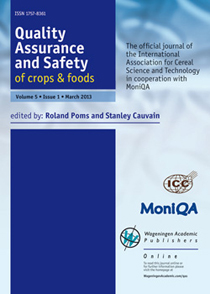
14 December 2012, Wageningen
Wageningen Academic Publishers is pleased to announce the collaboration with ICC and MoniQA for publishing 'Quality Assurance and Safety of Crops & Foods (QAS)'. This international journal was previously published by Wiley Blackwell. The journal will be published by Wageningen Academic Publishers starting in 2013 with Volume 5. The journal transfer will ensure further growth and continued delivery of high-quality content.
Mike Jacobs, Managing Director at Wageningen Academic Publishers, said, "We are delighted to add 'Quality Assurance and Safety of Crops & Foods' to our portfolio. It ties in nicely with the food and feed titles that we have published for years. It is our aim to use our experience in this topic and our personal approach to re-launch the journal. Together with our motivated editors we look forward to expanding the journal's reach and readership."
In the new setting Dr. Roland Poms (ICC) and Stanley Cauvain (BakeTran, UK), are the editors-in-chief. Both editors were already involved with 'Quality Assurance and Safety of Crops & Foods' before the transition.
Being asked for his opinion on the journal transfer, Roland Poms replied "The acquisition by Wageningen Academic Publishers is an exciting development in the life of QAS and I am convinced that this new collaboration with WAP will be most beneficial to the growing success of this international journal, which received ISI rating already in the first few years of its existence. QAS will perfectly complement the range of journal titles published by WAP and thus synergies in promotion of the journal and in increasing impact of the published articles will help strengthen QAS' position. As co-editor-in-chief I am looking forward to working with this energetic and enthusiastic team at WAP."
About 'Quality Assurance and Safety of Crops & Foods'
'Quality Assurance and Safety of Crops & Foods' publishes papers from around the globe with the major focus on analytical tools for assuring quality and safety, traceability and authenticity, food security, and technologies associated with harvesting, storing, processing and manufacturing of cereals, crops and derived foods and feeds, refined products and ingredients. The scope of publications will also cover other disciplines related to food and feed quality and safety, such as legal requirements, regulations, socio-economic impact, globalisation and trade, international organisations and agreements. The journal is internationally recognised, indexed by ISI Web of Science, peer reviewed and supported by an international editorial board. For more information, please visit the website: www.wageningenacademic.com/qas.
About Wageningen Academic Publishers
Wageningen Academic Publishers is an independent publishing company in the field of Life Sciences. It publishes journals as well as books. Wageningen Academic Publishers is one of the few STM publishers that do not only offer the option of Open Access publishing for journals, but also for books. For more information, please refer to the website: www.wageningenacademic.com.
About ICC
ICC is the pre-eminent international association in the field of cereal science and technology, committed to international cooperation through the dissemination of knowledge, conducting research, and developing standard methods that contribute to improved food quality, food safety and food security for the health and well-being of all people.
About MoniQA
MoniQA (International Association for Monitoring and Quality Assurance in the Total Food Supply Chain) is an international and interdisciplinary network of professionals from institutions working in food research, regulatory bodies and trade, providing solutions to promote a safer and secure food supply worldwide. MoniQA facilitates international research collaborations to enable services and products for food safety & quality assurance, progress and validation of analytical methods, training and continuous professional development, consultancy and socio-economic impact assessment.
Media contact
E-mail: qas [at] wageningenacademic [dot] com
Phone: +31 317 476516





